By clinching the 2023 drivers championship with six grands prix left to run, Max Verstappen’s domination of Formula 1 outstrips anything his immediate predecessor achieve.
Lewis Hamilton and Mercedes were F1’s supreme force between 2014 and Verstappen’s first title two years ago. But the Red Bull driver has achieved domination of a different kind in 2023, including a run of consecutive grand prix wins twice as long as anything Hamilton ever managed.When Formula 1 owners Liberty Media set out to improve the standard of competition in F1 by imposing a budget cap from 2021 and overhauling the technical regulations a year later, a contest as one sided as this was surely not what they expected or hoped to see. Verstappen had already set a high benchmark by winning 15 grands prix in 2022, but with half a dozen more still to go, it would be a surprise if he failed to raise the bar even further before the chequered flag falls on one of the most dominant seasons F1 has ever seen.
Hamilton vs Rosberg
2014
The first year of the modern ‘Mercedes era’ in Formula 1 put the Brackley-based team into a title-fighting position for the first time since 2009 (when it was Brawn GP). After the opening race it was actually McLaren who led the constructors’ standings, and Force India was Mercedes’ closest rival after three races.
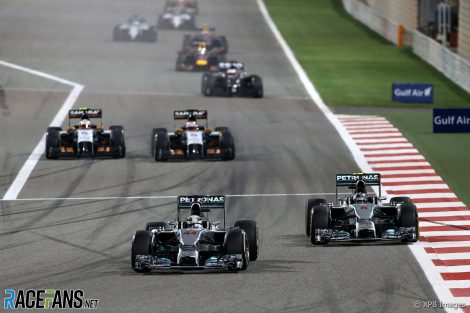
There was a gap of 79 points between Mercedes’ Nico Rosberg and Red Bull’s Daniel Ricciardo at the end of the season as they finished second and third in the standings (with Ricciardo exiting title contention with four races to go), and Lewis Hamilton was a further 67 points ahead as he won his second world championship title in the double points finale.
An opening race retirement meant he was chasing Rosberg until a fourth win in a row at the Spanish Grand Prix put him to the top of the standings. But Rosberg moved back ahead at the next race and was the championship leader until Hamilton won September’s Singapore Grand Prix. That was in the middle of a run of five victories on the trot, which was not enough to put him out of reach of Rosberg and the title was decided at the season-ending Abu Dhabi Grand Prix.
Hamilton may have won 11 races out of 19 en route to becoming champion, which sounds dominant, but only met the chequered flag as points leader on seven weekends. If his victory in Abu Dhabi had paid the usual 25 points instead of 50, he would have been champion by 42 points, a margin which would have been more reflective of the superiority he enjoyed.
Advert | Become a RaceFans supporter and
2015
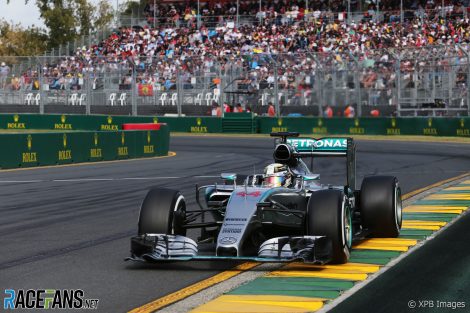
This time Hamilton was championship leader from start to finish, and Vettel only got ahead of Rosberg in the standings for four races. It only took four rounds for Hamilton to move 25 points clear at the top, and the tenth race of the season was the last time the gap was smaller than that. It was a dominant year for Hamilton, but also one of two halves.
He claimed pole for all but one of the first 12 grands prix, then Rosberg went unbeaten in qualifying at the last six rounds. But his improved form came too late and Hamilton was usually second fastest and either won or finished second in each of those six rounds.
Advert | Become a RaceFans supporter and
2016
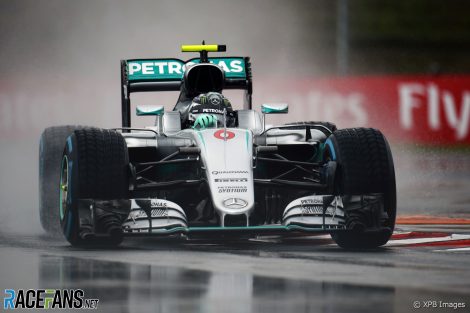
It took until victory in the Hungarian Grand Prix, the 11th race of the season, for Hamilton to replace Rosberg at the top of the standings and stayed there until four races later Rosberg won the Singapore Grand Prix. He remained ahead to the end, with Hamilton’s victory in the Abu Dhabi finale meaning Rosberg became champion by just five points.
At eight of the 21 rounds there was a gap of less than 10 points between the championship’s two. Ricciardo ended the year 129 points behind Rosberg in third place, exiting title contention with four races remaining.
Advert | Become a RaceFans supporter and
Hamilton vs Vettel
2017
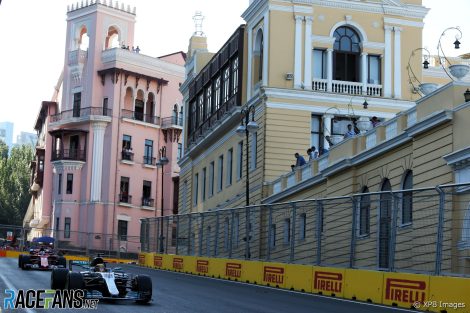
By winning the season opener Vettel had the advantage at first, and he spent over five months leading the two Mercedes drivers (with Valtteri Bottas replacing Rosberg, who retired from F1 after becoming champion) before Hamilton took his sixth win of the season at the Italian Grand Prix and moved ahead. That was round 13 of the campaign, and only in 2015 had Hamilton won more races (seven) by that point of the season.
In the seven races that followed, Hamilton went from being three to 46 points clear of Vettel and was crowned with two races to spare. That was still the longest a non-Mercedes driver had remained in title contention since Vettel won the title for Red Bull in 2013.
2018
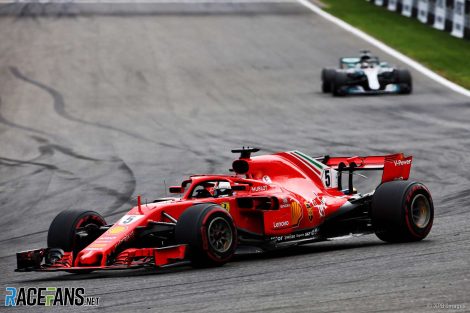
Vettel took back the advantage by winning the Canadian Grand Prix, the seventh round of the season, but Hamilton won the French Grand Prix two weeks later to reclaim first place. Hamilton then retired from the Austrian Grand Prix, putting Vettel back ahead after he finished third, and two races later a German Grand Prix win for Hamilton meant Mercedes was atop the standings again and on home soil too.
Hamilton then went on a winning run, while Vettel ended up being beaten by team mate Kimi Raikkonen on occasion, and the title fight was over after 19 of the 21 races. It took Hamilton until round 14 to reach six wins this time, but he won eight of the last 11 races and took the title by a huge 88 points.
Advert | Become a RaceFans supporter and
Hamilton vs Bottas
2019
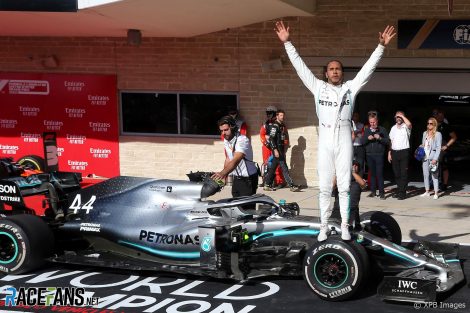
With five races to go Ferrari’s Charles Leclerc and Red Bull’s Max Verstappen were both still in title contention, and Bottas’ win in the following race – the Japanese Grand Prix – reduced Hamilton’s gap to 64 points but also meant it became an all-Mercedes title fight thereon.
Bottas picked up another win at the United States Grand Prix but that was not enough to prevent Hamilton from winning the title with two races to go. By the end of the season, there was a gap of 87 points to Bottas and 135 to Verstappen in third.
2020
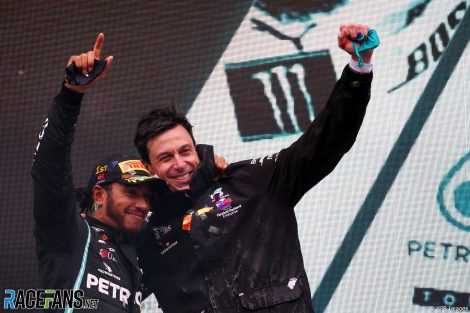
Hamilton won six of the first nine races, while Bottas only got two wins all year. The first was in the season opener, meaning he was points leader for two rounds, and when he claimed the second in round ten he was 44 points behind his team mate.
Verstappen was the pair’s closest rival but it only took 13 races for him to be knocked out of title contention, and Hamilton became champion a round later. Despite missing a race due to having Covid-19, Hamilton ended the season with a colossal 124-point lead. His final title win to date was his most emphatic.
Advert | Become a RaceFans supporter and
Verstappen vs Perez
2023
A 22-round schedule should mean the title fight goes on for more races, with more points-scoring opportunities to come, but it became an all-Red Bull fight after round 16 – the Japanese Grand Prix – and then Verstappen got the job done today in the sprint race at Losail.
While he and Perez shared the wins over the first four rounds, Verstappen then went on a tear, winning an unprecedent 10 consecutive grands prix. The title was a foregone conclusion long before he passed the points threshold necessary to secure it.Ferrari’s Carlos Sainz Jnr prevented Red Bull from having an unbeaten campaign by winning the Singapore Grand Prix, but he has little more than a third of Verstappen’s points tally at present and it’s actually Hamilton who is the lead non-Red Bull driver in the standings. But he only has five podiums and just two of those have been second places.
Aside from Sainz’s success, there have only been four grands prix with a green flag finish where a non-Red Bull driver has finished within ten seconds of victory, and only two times when they have been within five seconds of the victorious Verstappen.
Not since Michael Schumacher won 12 of the first 13 races in 2004 on the way to his seventh world championship has a driver annihilated the competition from the start of the season as effectively as Verstappen has.
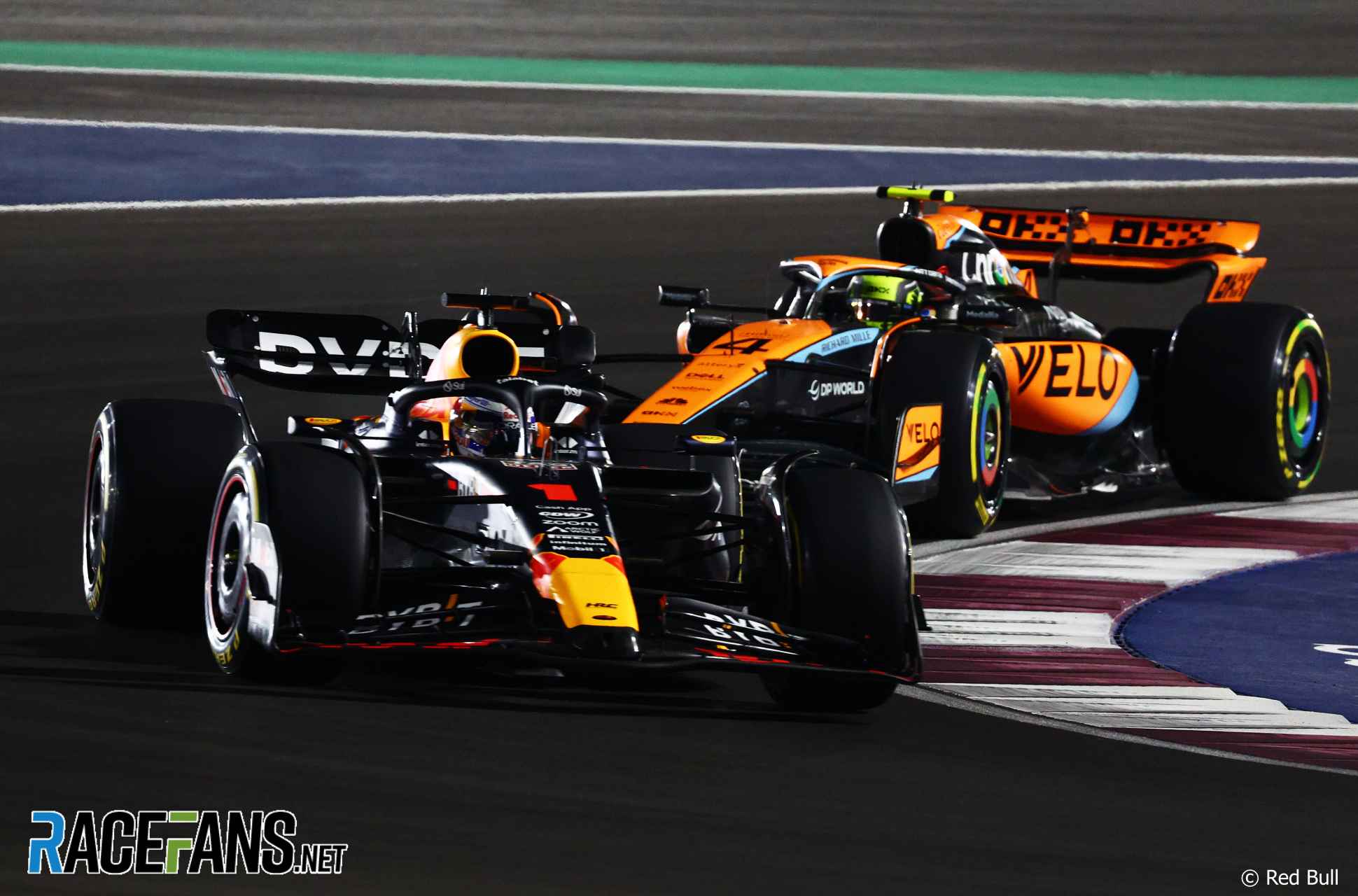
2023 F1 season
- FIA president cleared of alleged interference in two 2023 races
- First week viewing figures for new Drive to Survive season fall again
- Max who? Drive to Survive season six prefers its favourite faces
- RaceFans’ complete 2023 season review
- The F1 drivers who pulled off the 10 biggest charges through the field in 2023




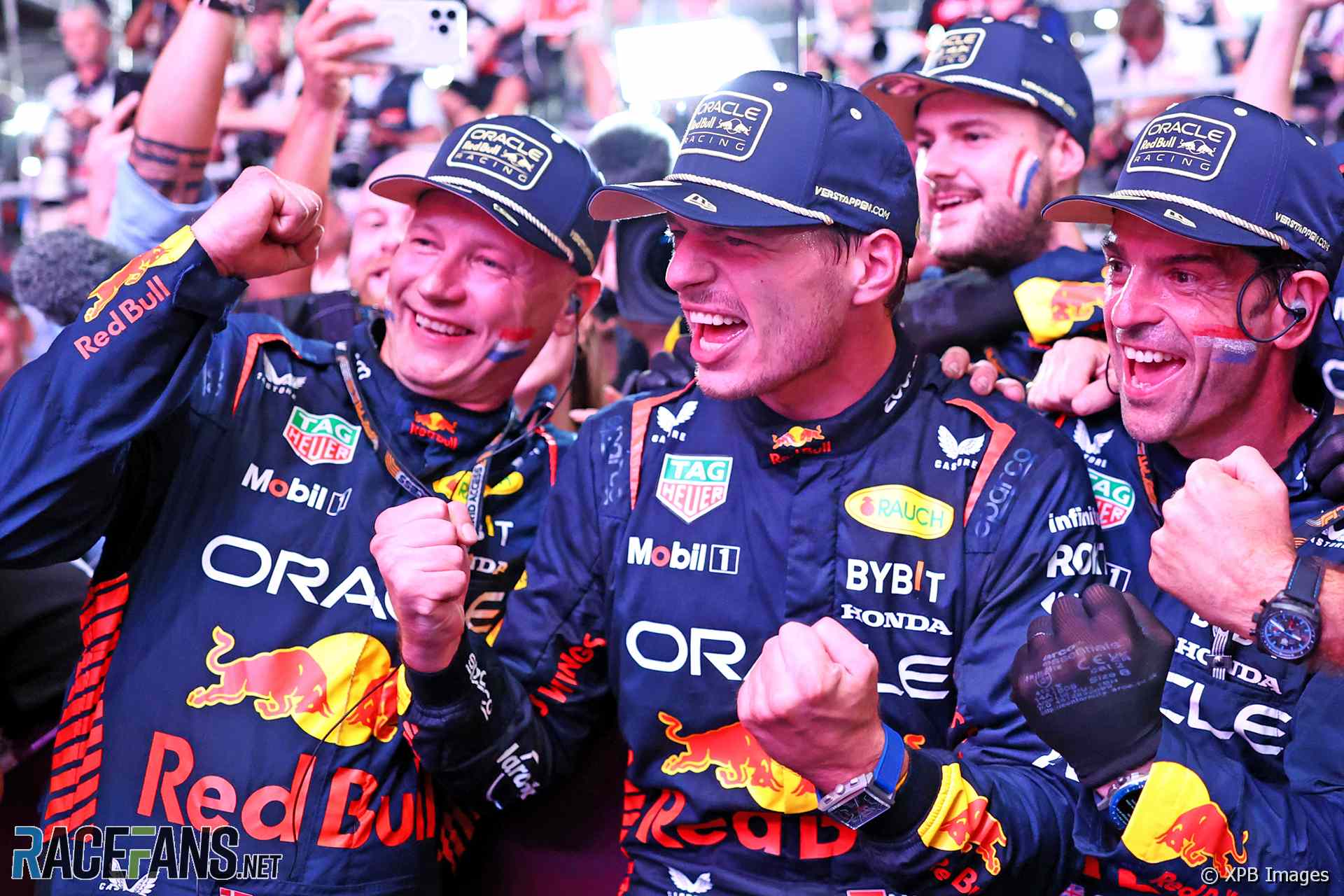
hahostolze (@hahostolze)
7th October 2023, 20:06
The Mercedes era was competitive because Mercedes had two good drivers from 2014 through 2016. The Mercedes car was more dominant by far.
osnola
7th October 2023, 20:08
The Mercedes car/engine was superior to all others
Every driver in that car was able to win races and championships.
Every driver the Mercedes team used has some off days or inconsistent driving during the season
The main difference is Verstappen not only drives an exceptional car but does it consistent on a extreme level of perfection during an entire season. Something Lewis I e. never was able to do. And the same goes for Rosberg or Bottas 1.0, 2.0 etc..
Ferdinand
7th October 2023, 22:48
I agree. The Mercedes car was more dominant and over a far longer period. It only looked competitive because there were driver in it that operated at a similar level in the sense that it was easy for both to get the maximum out of the car. Lewis being better didn’t make a huge difference for the other driver as the car would take him up the front row anyways. Makes you wonder whether it would have made a difference if others were put in that car. Probably not, especially looking at what Bottas has achieved ever since he got out of that car. So I would rather say we witness a driver being dominant now vs a car being dominant back then, two things that are hardly comparable. And it’s just two years in right now. Don’t understand what the fuzz is about when back then we had 7 years of it. You would almost think there is an agenda behind the persistent and in my opinion way too early narrative.
pcxmac (@pcxmac)
8th October 2023, 4:31
or mercedes are, were still an average team with a huge motor advantage. vs rbr are a great team, performance wise and just make all the other teams on the grid look silly, since the days of Vettel+. it rbr wanted to they could turn alpha tauri in to regular podium contenders, but beneath the veil lies many politics we are supposed to shrug off. Mercedes are still as good as they were in 2013/2012. and that has to do with who is leading the team.
Pironi the Provocateur (@pironitheprovocateur)
7th October 2023, 20:20
Disagree, 2019 and 2020 felt basically the same. The title was basically decided in the first third of the season.
F1 frog (@f1frog)
7th October 2023, 20:52
2019 and 2020 were still far more competitive seasons than 2023, even if the championship battle was also a foregone conclusion early on, and still weren’t as foregone as this year. Particularly 2019. That year, Valtteri Bottas won four times, all entirely on merit having genuinely outperformed Lewis Hamilton. He also took pole on five occasions, the same number as Hamilton. Max Verstappen won three times, each time beating Hamilton on merit with no luck required at all, while Charles Leclerc won twice and Sebastian Vettel once, the same applying again. Leclerc actually took seven pole positions, more than anyone else. So Lewis Hamilton only won 11/21 races that year. And those included lucky wins in Bahrain and Russia which should have gone to Leclerc, and wins that he had to really work for in Monaco, Canada, Britain, Hungary and Mexico. So perhaps you could only point to China, Spain, France and Abu Dhabi as relatively straightforward wins, and Bottas still took pole in the first two of those. Despite the championship standings, it was a decently competitive season.
Compare that to Max Verstappen in 2023. He has been defeated on just three occasions, of which Jeddah was just bad luck with the qualifying problem, Baku was a bit of bad luck but generally the only time he was beaten by Perez on merit, and Singapore was a race when the car was uncompetitive. Of the rest of the races, the only times you could say his win was even remotely in doubt would be Miami at the start, Monaco for a few laps, possibly there was a tiny bit of doubt in Zandvoort and Monza for a short time, but realistically that is 11/16 straightforward wins. That is a lot more than the 4/21 for Hamilton in 2019.
2020 was a bit closer to 2023 in terms of domination, but Hamilton still lost to Bottas on merit in Austria, to Verstappen on merit in the second Silverstone race and in Abu Dhabi, and made mistakes in Monza and Sochi that cost him those wins. He also had the tyre failure at the end in Silverstone, had to put in a special drive to win in Turkey and didn’t even race in Sakhir on the outer loop. He was also under genuine pressure from Bottas in Mugello. So I make that 8/17 relatively straightforward wins, and I think there are more that could come off that list than in the 2023 list (Styria, Hungary, Spain, Belgium, Germany, Portugal, Imola, Bahrain). Making 2020 also a more competitive season than 2023.
I still rate Lewis Hamilton at his peak as the slightly superior driver to Max Verstappen, but Verstappen is the most consistent driver in Formula 1 history, and unfortunately that makes it particularly dull to watch when he has the best car. But it has been an extraordinary season from Verstappen, up there with the very greatest seasons ever (Ascari 1952, Fangio 1954, Moss 1959, Clark 1963 and 1965, Stewart 1973, Prost 1986, Senna 1993, Schumacher 2004, Vettel 2011, Alonso 2012 and Hamilton 2018).
MadMax (@madmax)
7th October 2023, 20:24
The rocketship lets Verstappen cruise from victory to victory. More dominant car then Merc ever was.
SaraJ (@sjzelli)
8th October 2023, 3:21
Lol. Show me where the race car touched you…
This article and sour people like you prove all logic has left the building.
PlosslF1
7th October 2023, 20:54
And some say Lewis had it easy, Max has had zero competition this year, lets see how he does with a team mate who can take the fight to him. Will he be super Max, or will we see like we did in the last 4 races of 21 a driver who spent most of the time trying to take out the opposition?
Guess were have to wait till 2026 to see….
Doggy
7th October 2023, 22:32
Leaving a side that your comment, unfortunately, implies that everyone tries to destroy Lewis and admire Max, you need to look back instead of waiting till 2026.
If you are willing to open your mind and judge fairly, then you will get your answer without having to wait that long.
Ps: if any driver wants to take another out they would do it; it’s fairly easy.
David BR (@david-br)
7th October 2023, 21:08
Just 6 races to go still.
The title was over in Miami (and remember congratulating Verstappen on his third title back then). It doesn’t feel like a real season this year with zero competition for either title. Sure some good racing. But it’s all a bit cos-play Formula 1.
iCarbs (@icarby)
7th October 2023, 22:23
I personally think the RB19 is the best car i’ve seen in quite sometime and would probably prefer to have this than any of the other Merc cars between 2014 – 2020. Listening to Adrian Newey’s pod cast and the recent F1 article talking about the RB19 pretty much confirmed it for me. The car is much easier to setup, designed better, compromised better, weak on only 1 circuit so far, predicable (for at least Max) and all they needed to do from the RB18 was to shed weight (slight oversimplification). However, Max still needs to get into the car and do the work, but if he’s not going to get a realistic challenge there is no reason for him to panic, worry, feel pressure, etc.
A well deserved title for him and is setting records that I’m expecting to be very difficult to beat.
Kribana (@krichelle)
7th October 2023, 23:28
W05 and W07 are better. W07 had the pace to win all races in 2016 and the W05 too. They had reliability problems but if you go for full performance pace related, both these cars were almost guaranteed wins for any driver in them. Or was it that Hamilton and Rosberg were the perfect pairing for those cars? You’d always wonder if anyone else got in the Mercedes cars of 2014-2020, they would guarantee the team at least a win compared to the Red Bulls of last year and this year.
D
8th October 2023, 5:39
Analysing team (car) competitivnes based just on number of race wins, and how close the title fight was, is superficial.
For example, there is a lot more to be said about Mercedes 3 race defeats in 2014. Did others beat them purely on pace, or were there other factors that helped them win?
Red Andy (@red-andy)
8th October 2023, 6:30
Agree – I seem to remember the last time this topic came up, someone with a better memory than me did a back-of-an-envelope analysis of the 8 races Mercedes failed to win between 2014 and 2016. The conclusion was that on only one of those occasions were they genuinely outpaced; the rest of the time they lost victory due to mistakes or reliability problems.
You can use different metrics to make a different case depending on your preferred narrative. Personally I don’t find this current era anywhere near as frustrating to watch as the Mercedes years, but we’re only two years in – if this level of dominance continues until 2026 as some predict, my views might have changed by then.
Ludewig
8th October 2023, 11:16
And don’t forget that Mercedes intentionally turned down the engine to prevent a rule change to slow them down. The real pace of the car was higher than their race settings.
Mathias
8th October 2023, 6:33
the mere fact that you must compare mercedes against mercedes drivers show the title of the article is very much wrong
drmouse (@drmouse)
8th October 2023, 8:43
As much as I appreciate this analysis, I don’t think it actually shows much, and for one reason: Perez.
Perez has had an absolute mare of a season. His qualifying performances have been way below what we would expect for him, and his race day performance has been even worse. This massively colours the analysis. None of the drivers analysed in the other seasons had such a sub-standard season.
That said, many commenters seen to be misinterpreting the article, I think. This is an analysis of the dominance of a driver (or car/driver pairing) over the season, not car dominance. This season has seen Max completely dominant in a way we never saw from a Mercedes driver. In that car, he’s annihilated everyone else on the grid, including his own teammate (though that’s not difficult given the above). He’s had no trouble building a gap of 20+ seconds from all other competitors and then maintaining it for many races. Verstappen has been utterly dominant this year in a way I haven’t seen before, and that’s what this analysis shows.
The problem, again, is Perez. It’s really difficult to evaluate how much is the car and how much is the driver in F1 at the best of times, but it’s impossible this year with how badly Perez has performed. It could be that the car is only a “rocket ship”, and Perez has just completely lost it. It could be that the car is only a small way ahead, Perez is just having a bit of a bad season, and Max is smashing it. It could be (though extremely unlikely) that Perez is actually driving at his normal level, the car is mediocre, and Max is a miracle worker.
Personally, as discussed elsewhere, I think it’s the first option. But any analysis of the car performance is made significantly more difficult this year by Perez’ performance.
Illusive (@illusive)
8th October 2023, 9:05
Max is an unrelenting force, Lewis made mistakes and would fall off in the season, Max doesnt and thats why we see these charts.
PlosslF1
8th October 2023, 13:05
As I said earlier Max hasnt had any pressure applied to him this season or much of the previous one, when Lewis came for him in the last 4 races of 21 he started to fold like a house of cards that was saved by Masi, Max these days is literally taking a Sunday drive to victory without really pushing himself or the car. Could Max take the heat that Rosberg used, and retired afterwards as he couldnt face doing it again, in 2016. When we see Max up against a good team mate or another team then we will see how good he is….
drmouse (@drmouse)
8th October 2023, 14:23
He’s under far less pressure than Lewis was, though. His teammate is nowhere, and no other car comes close to matching. He is often a pit stop ahead of the entire test of the field, while looking like he’s out for a Sunday drive.
It’s much easier to make no mistakes when you have no pressure on you, when you know you don’t need to push, than when you’re trying to get the best out of the car. If you know that you’re on the edge and the tiniest mistake could end the race for you, you’re more likely to make that mistake than when you’re operating well within your own and your car’s limits and a similar mistake probably won’t lose you the win.
None of this is meant to be an attack on Max, btw. He’s a great driver doing a fantastic job. But the comparison you make omits this element.
Jimmy Cliff
8th October 2023, 20:41
Interesting that the comparison is made between Max 10 wins in a row and Lewis 5 wins. Everyone seems to forget that Rosberg managed 7 in a row in the same period.
The Mercedes in 2014-2016 was far more dominant in qualifying and race pace than the Red Bull is in 2023.
Also the entire field is the closest it has been for decades certainly in qualifying where most cars are within 1 second pretty much every weekend.
Remove Red Bull and the British media would be raving over how good the competition and the new rules are and pf course how spectacular Lewis is winning the title in 2023.
But because Max is doing most of the winning and making the real difference with his brilliant and extremely consistent near flawless performance week after week the tone of the British media is boring, problematic, bad for F1, Max has weak teammates etc etc.
Why does everything always evolve around Mercedes and Lewis in the British media?
Why was this extensive article prepared in advance instead of an extensive article just about Verstappen’s championship(s). Article mostly about Mercedes posted at moment that Max wins his 3rd championship is simply odd and sad.